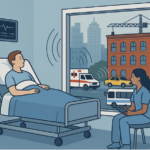Every day, we each encounter a variety of sounds, loud and quiet, that surround us. From the blaring honk of a car to the roar of an airplane above, or the heavy footsteps of an upstairs neighbor to the pounding beat from your car’s stereo – we are constantly bombarded. With all this around us, how can we tell when things have gotten a little too loud? Interestingly, how each individual experiences the sounds around them is a unique and singular experience. Despite differences in perceived noise, there are levels that can actually cause harm and even irreparable damage to our ears.
To begin a discussion on what qualifies as too loud, we must first understand how sound is measured.
How Loud is a Decibel?
Sound is created when vibration causes particles to bump into each other, creating a pressure wave. The unit to measure the intensity of a sound is called the decibel, abbreviated as dB. The decibel scale begins at 0, which would represent sounds that are near total silence. From there, the scale increases to higher values of sound audible to the human ear. Sounds that are 10 times stronger than near silence measure 10 dB on the scale, while sounds 1000 times more powerful are 30 dB. But just how loud is 105 decibels as it relates to sounds we hear in daily life, for example? To get a sense of the decibel levels of common noises we encounter every day are, consider the following decibel chart of common sounds:
- How loud is 80 dB: Next time you wash the dishes, take note of how noisy the garbage disposal is. The sound of a garbage disposal is about 80 decibels.
- How loud is 100 dB: At this level, prolonged exposure can cause damage to the ear and hearing loss. Common noises that register at 100 decibels include a jackhammer and lawn mower.
- How loud is 110 dB: There’s nothing more annoying than the jarring sound of a car or cars honking, especially if you’re a short distance away. Just how many decibels is a car horn? Car horns register at about 110 dB on the scale.
- How loud is 120 decibels: If you’ve heard the jet engine of a plane flying overhead, you’ve experienced a decibel level of 120. Another sound experience reaching 120 decibels is the average rock concert.
- How loud is 130 decibels: As we are nearing very high levels on the decibel chart, we reach sounds like the take-off of an airplane, which registers at about 130 decibels.
- How loud is 150 decibels: Encountering a sound at 150 decibels can result in permanent damage to your hearing. An example would be experiencing fireworks at close range without ear protection.
Keep in mind that the intensity of a sound largely depends on your distance from the source of the sound. For example, the dB levels of a car honking its horn right next to you versus a car a few blocks away would be very different. To maintain consistency of dB ratings, measurements are taken while near the sound.
How Many Decibels is Too Loud?
It is roughly estimated that 40 million individuals in the United States are currently suffering from hearing loss. A staggering 25% of those with hearing loss lost their hearing from noise. The severity of noise-induced hearing loss depends on the power of the sound in addition to the length of exposure to the sound. It is true that hearing loss can result after a one time, single experience of an incredibly loud sound. It can also result after repeated exposure to sounds over a length of time.
So just how many decibels is too loud for the human ear? Studies have shown that any sound registering above 85 dB can cause hearing loss and even permanent damage to the structures of the ear that register sound. Hearing loss is a result of damage to the microscopic hair cells that sit inside the cochlea.
Long-Term Impacts of Sound
While the most obvious impact from exposure to loud noise is hearing loss, there are a number of other impacts to health that can significantly reduce quality of life. External noise can lead to high blood pressure, agitation, and stress. Additionally, exposure over time can even increase the risk of heart attack and stroke. Often times those experiencing disturbances from noise report interrupted sleep and insomnia, leading to exhaustion and reduced productivity at work or school.
Protecting Against Sound
If you find yourself encountering unpleasant sound on a regular basis, it’s important to take precautionary steps as early as possible to protect your hearing and prevent damage to your health. Use the following tips to stay safe:
- Use ear plugs: when you know you’ll be in a particularly noisy environment, such as a concert or near construction sites, invest in quality ear plugs to protect yourself. If at a concert, be sure to maintain adequate distance from speakers.
- Turn down the volume: when listening to music in your car or through headphones, be mindful of the volume. While it’s fun to jam out to your favorite song, turning it up too loud can be dangerous.
- Soundproof your home: unwanted noise that enters the home from neighbors or the street is not only annoying, it can diminish sleep and cause stress. Take time to purchase white noise machines, fill gaps and spaces, and install soundproof windows to keep a peaceful and quiet home environment.



